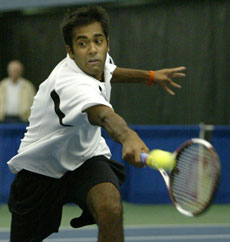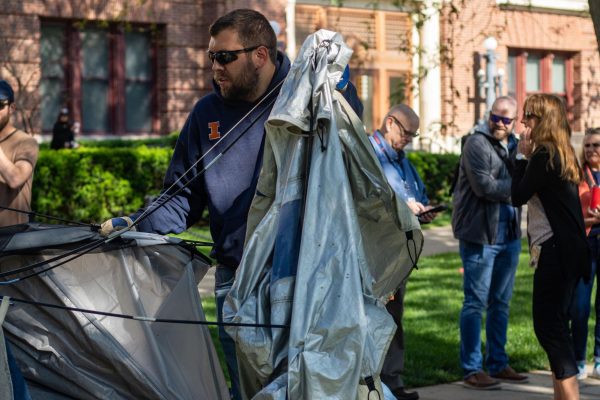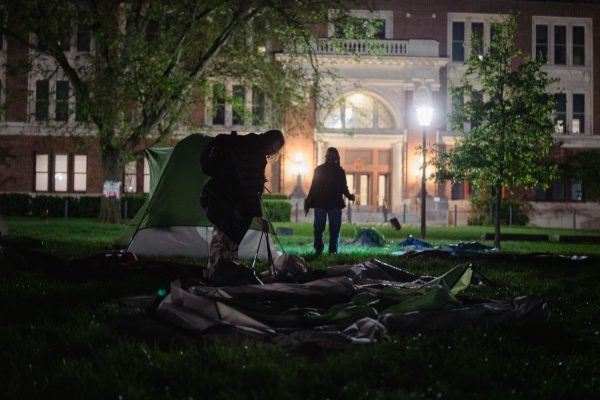Tennis players benefit from college

Ed Thomson
January 19, 2005
Editor’s note: This is the second piece of a three-part series discussing the pattern of younger athletes choosing a professional career over college.
Bobby Reynolds had never considered playing professional tennis in high school. After three years at Vanderbilt, though, he capitalized on his collegiate success – he held the No. 1 spot in the Intercollegiate Tennis Association’s (ITA) year-end rankings – and headed to the pro circuit.
Amer Delic and Rajeev Ram, former Illinois All-Americans, made similar decisions. They started their professional careers after stints at the collegiate level.
The trio made the 2002-03 season their last in college. That year, the men made many improvements to their tennis games while their teams experienced unprecedented success. Delic and Ram helped the Illini to the NCAA team title. Delic then won the NCAA singles title while Ram took the doubles title. Reynolds helped the Commodores to their first SEC tournament title. He was only the second Vanderbilt men’s tennis player to earn All-American honors when he first garnished that distinction as a sophomore.
With their collegiate success to guide them, there was no turning back.
Get The Daily Illini in your inbox!
Delic and Reynolds were juniors – one year shy of a degree. Ram, a freshman, was only one semester into his collegiate career when he decided not to return to Illinois.
The men, who were highly recruited, said they knew attending college would be instrumental to their success.
Reynolds initially chose to attend Vanderbilt because it was close to his home in Acworth, Ga. He said he liked the coaches and wanted to attend a school with a good business program within the tough SEC conference. Delic and Ram were the top prospects in the nation the years they were recruited by Illinois head coach Craig Tiley. They chose Illinois in large part because of Tiley’s commitment to developing athletes that were capable of succeeding at the professional level.
The men’s time in college, though short, has been crucial to their success since they turned pro. Both Illini had first-round victories at the U.S. Open last year.
It was in college, Reynolds said, that he learned the self-discipline required to be successful. Juggling practice, classes, homework and other obligations made it easier to conform to the demanding lifestyle of the pro circuit. Learning how to interact with people from various backgrounds has helped him when traveling.
“If you don’t interact with people well, a year seems a lot longer than it should be,” Reynolds said. “Going to college and interacting with different people makes you grow.”
Ram needed time in college to develop physically and mature. He said it was during college that he was able to figure out what style of game he needed to play to be a confident, aggressive pro. He also used the time to gain self-confidence, which he said is necessary at the professional level.
“With as much as you lose out here, if your confidence is shaky, it’s not going to work,” Ram said. “(The top players) are losing all the time, but you still watch them play and it never seems like their confidence is shaky at all … it boils down to staying in the present.”
Had Delic turned pro any earlier, Tiley said he would have been discouraged because he would have lost a lot of matches.
“But, he came to college and he won a lot of matches and he believed that he could be good,” Tiley said. “And now he can be good – he can be great.”
When it came time to make the decision whether or not to return to college, the men chose the grueling tour schedule, traveling up to 40 weeks per year.
Instead of waking up and going to classes, they spend their time on the courts. Tennis is no longer a game, but a full-time job. It is a job Ram said he feels lucky to have.
To stay or not to stay?
The men said they talked to their parents and coaches about whether to return to college – but the final decision was theirs. Reynolds said he did not want to spend the rest of his career wondering, ‘What if?’ and reasoned that he only has a year of college to finish after his tennis career ends. Ram vowed to return to college – probably at Illinois – if he did not succeed professionally.
Knowing they would have a United States Tennis Association (USTA) training group to work with helped the men make their decision. Former USTA High Performance coach Dean Goldfine and current USTA High Performance coach Ricardo Acuna worked with Delic, Ram, Reynolds and Brian Baker, a 19-year-old professional, last year. USTA High Performance coaches help the athletes they work with make their tournament schedules, organize practices and travel with them. The USTA also helps the men by awarding them wildcards into tournaments, allowing them a chance to compete in the main draw of events – instead of playing through qualifying rounds -or play in the qualifying rounds of top-tier events. Financial aid is also available to top athletes through grant programs.
“It’s tough enough to try to do well out there, on the tour, without that pressure of having to make money at that point – because you’re not going to make money at that point,” Goldfine said.
By being part of a USTA training group, the men have the additional advantages of having other athletes to train with, creating a team-like atmosphere despite the competitive, lonely nature of the pro circuit. Although they compete against each other at multiple tournaments, the men can often be seen in the stands supporting each other as well. At the Denver Challenger, Baker defeated Ram in the quarterfinal round en route to winning the singles title. But that did not stop the men from joining forces to win the doubles title at the same event.
“You’re competing against each other because of rankings, but nobody wants to fall behind,” Reynolds said. “Just to know that they’re cheering for you, it makes you not want to lose even more.”
Vanderbilt head coach Ken Flach and Tiley, the Illinois head coach, have remained in contact with their prot‚g‚s as well, often providing counsel. Losses, Reynolds said, can often start snowballing when competing in venues where the athletes have little – if any – crowd support.
“When you’re on a high streak and you’re playing well you feel good about yourself (and) you don’t really think about the alternative,” Reynolds said. “But when you’re losing, you think you can’t hit the ball on the court and you have to regroup.”
Goldfine said he has seen the group improve. However, with the demands of the pro circuit, it is hard to make dramatic changes to the athletes’ games. Many of the major changes to the men’s playing style occurred in college. Goldfine credits Tiley with helping Delic and Ram determine which weaknesses to target for improvement and what style of tennis they needed to play to be successful at the professional level.
“When you come out and play pro tennis it’s easy to fine-tune things,” Goldfine said. “But to really make major adjustments when you are trying to play and make it your career – that is difficult to do.”
But the young Americans know the responsibility for their success lies solely on their shoulders.
“When you do something well, you get all the credit,” Ram said. “When things don’t go well or you don’t do the things that you’re supposed to, you’re the one who gets all the blame.”






